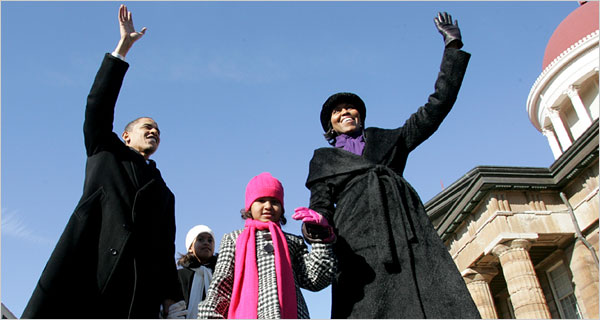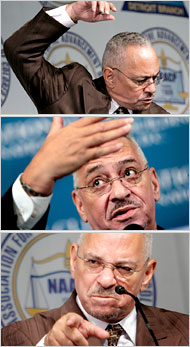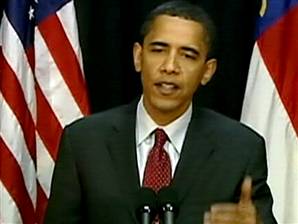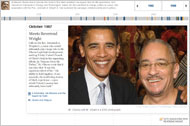Senator Obama and His Minister
The
New York Times’ lead: "Obama broke forcefully on Tuesday with his former
pastor, the Rev. Jeremiah A. Wright Jr., in an effort to curtail a drama of
race, values, patriotism and betrayal that has enveloped his presidential
candidacy at a critical juncture." More: "At a minimum, the spectacle of Mr.
Wright’s multiday media tour and Mr. Obama’s rolling response grabbed the
attention of the most important constituency in politics now: the uncommitted
superdelegates - party officials and elected Democrats - who hold the balance of
power in the nominating battle."
VIDEO:
NBC's Andrea Mitchell reports on Sen. Barack Obama calling remarks by his former
pastor, the Rev. Jeremiah Wright, "destructive".
“Eileen Macoll, a Democratic county chairman from Washington State who has
not chosen a candidate, said she was stunned at the extent of national attention
the episode has drawn, and she said she believed it would give superdelegates
pause. ‘I’m a little surprised at how much traction it is getting, and I do
believe it is beginning to reflect negatively on Senator Obama’s campaign,’ Ms.
Macoll said. ‘I think he’s handling it very well, but I think it’s almost
impossible to make people feel comfortable about this.’”
The
Los Angeles Times writes, "Some black leaders said Tuesday that they were
frustrated at Wright for undertaking a publicity tour in recent days that may
have harmed the chance to elect the first black president. And a number of
African American church leaders expressed alarm that Wright, whose views on
social issues are far to the left of most black clergy, claimed on Monday to
speak for all black churches. ‘I wish that Jeremiah, my friend, had kept his eye
on the prize,’ said the Rev. Frank Madison Reid III, pastor of a large African
Methodist Episcopal congregation in Baltimore who studied with Wright and has
invited him regularly to preach at his church. ‘And the prize here for America,
for all Americans, is that we can elect the first black man for the
presidency.’”
The
Washington Post: “At a meeting of black religious leaders at the Howard
University School of Divinity on Tuesday, Wright declined to address the
firestorm that his remarks had ignited. ‘You heard what I said [Monday]
morning,’ he told a reporter. ‘I just wish that the media would focus on more of
what they are saying in there, because they are trying to make this about me and
Barack.’”
The
New York Post: “After 20 years of loving Barack like he was a member of his
own family, for Jeremiah to see Barack saying over and over that he didn't know
about Jeremiah's views during those years, that he wasn't familiar with what
Jeremiah had said, that he may have missed church on this day or that and didn't
hear what Jeremiah said, this is seen by Jeremiah as nonsense and betrayal,"
said the source, who has deep roots in Wright's Chicago community and is
familiar with his thinking on the matter. 'Jeremiah is trying to defend his
congregation and the work of his ministry by saying what he is saying now," the
source added. "Jeremiah doesn't care if he derails Obama's candidacy or not . .
. He knows what he's doing. Obviously, he's not a dumb man. He knows he's not
helping.'"
The
Boston Globe: “The condemnation was a dramatic shift for Obama, who had
tried to navigate a personal and political minefield: maintaining a relationship
with the minister who brought him to Christianity, performed his wedding, and
baptized his two daughters, while distancing himself from Wright's most
incendiary sermons and trying to quell a controversy that threatened to
undermine Obama's campaign's focus on racial unity.”
The
Washington Post’s editorial page mostly praises Obama denouncing Wright
yesterday. “Did Mr. Obama climb out of that hole yesterday? It seems to us that
the whole sorry episode raises legitimate questions about his judgment… But Mr.
Obama is right when he says that his entire career is antithetical to the
divisiveness of the Rev. Wright's comments. We've found things to cheer and
things to criticize about Mr. Obama during this long campaign, but we don't see
how anyone could question his commitment to transcending old racial battles and
finding common ground. The Rev. Wright doesn't speak for the candidate, and we
hope the pastor doesn't become a continuing excuse for political ads built on
racial fears.”
The
New York Times’ editorial page: “It took more time than it should have, but
on Tuesday Barack Obama firmly rejected the racism and paranoia of his former
pastor, the Rev. Jeremiah Wright Jr., and he made it clear that the preacher
does not represent him, his politics or his campaign.”
Maureen Dowd: "The Illinois senator doesn’t pay attention to the mythic
nature of campaigns, but if he did, he would recognize the narrative of the
classic hero myth: The young hero ventures out on an adventure to seek a golden
fleece or an Oval Office; he has to kill monsters and face hurdles before he
returns home, knocks off his father and assumes the throne. Tuesday was more
than a Sister Souljah moment; it was a painful form of political patricide. ‘I
did not vet my pastor before I decided to run for the presidency,’ Obama said.
In a campaign that’s all about who’s vetted, maybe he should have."
The
Globe’s Canellos writes that “voters and other political observers will
inevitably wonder what took so long -- and how Obama could have misjudged
someone to whom he was very close.”
But the
Globe’s Lehigh writes, “So as we begin yet another round of discussion about
the radical reverend, let me offer a radical proposition. What's really relevant
here is not what Jeremiah Wright says but what Barack Obama believes.” More:
“With the wrathful reverend now delightedly reinjecting himself into the
headlines, that's precisely what Obama needed to do. ... And yet, no matter what
conspiracy theories the reverend subscribes to and no matter what moral
equivalencies he draws, it's Obama, not Wright, who is the presidential
candidate.
Some editorials hit Wright harder than anyone else, like
this one in the
Cleveland Plain Dealer…
… and this one from the
San Antonio Express-News.
Meanwhile, the
Minneapolis Star-Tribune believes Obama will face more Wright tests. After
watching Wright on Monday, the paper doesn't seem to believe Wright will simply
fade away.
A Strained Wright-Obama Bond Finally Snaps

Ruth Fremson/The New York Times
When Barack Obama, his wife and children at his side,
announced last year that he was running for president, the Rev. Jeremiah A.
Wright Jr. was not there. He had been uninvited by Mr. Obama from delivering
an invocation.
Published: May 1, 2008
Late Monday night, in the Carolina Inn in Chapel Hill, N.C.,
Barack Obama’s long, slow fuse burned to an end. Earlier that day he had
thumbed through his BlackBerry, reading accounts of the Rev.
Jeremiah A. Wright Jr.’s latest explosive comments on race and America.
But his remarks to the press this day had amounted to a shrug of
frustration.

Top, Paul Sancya/Associated Press; Chip Somodevilla/Getty
Images; Bill Pugliano/Getty Images
Mr. Wright’s multiday media tour of the last
week was the breaking point in a 20-year relationship with Mr.
Obama.
Only in this hotel room, confronted with the televised
replay of the combustible pastor, did the candidate realize the full import
of the remarks, his aides say. At the same time, aides fielded phone calls
and e-mail from uncommitted superdelegates, several demanding that the
candidate speak out more forcefully.
As Mr. Obama told close friends after watching the replay,
he felt dumbfounded, even betrayed, particularly by Mr. Wright’s implication
that Mr. Obama was being hypocritical. He could not tolerate that.
The next afternoon, Mr. Obama held a news conference and
denounced his former pastor’s views as “divisive and destructive,” giving
“comfort to those who prey on hate.” And so, with those remarks, a tightly
knit relationship finally came apart — Mr. Wright had married Mr. Obama and
his wife, Michelle, and baptized their children.
Theirs was a long and painful falling out, marked by a
degree of mutual incomprehension, friends and aides say. It began at the
moment Mr. Obama declared his candidacy, when he abruptly uninvited his
pastor from delivering an invocation, injuring the older man’s pride and
fueling his anger.
Mr. Obama’s campaign has been
striking for its discipline. This is a candidate who prides himself on his
coolness and singleness of purpose, not to mention his ability to take on
opponents as formidable as Senator
Hillary Rodham Clinton
and her husband,
Bill Clinton, the
former president. But Mr. Obama discovered one figure who has confounded
him, his own pastor.
In recent months, the candidate has tried to distance
himself from Mr. Wright and his often radical views, even as he felt
compelled to understand and explain his former pastor to a larger,
predominantly white political world.
As for Mr. Wright, he saw a cascade of perceived slights
coming from the campaign of a bright young follower whose political
ambitions were tugging him away from Trinity United Church of Christ. He saw
the church he had founded coming under pressure from reporters and critics,
forced to hire security guards. And he made no secret of whom he blamed: Mr.
Obama’s political adviser, David Axelrod, a white Chicago political
operative.
Only a few years ago, the tightness of the bond between
Mr. Obama and Mr. Wright was difficult to overstate. Mr. Obama titled his
second book, “The Audacity of Hope,” after one of Mr. Wright’s sermons, and
his pastor was the first one he thanked when he gained election as a United
States senator in 2004. “Let me thank my pastor, Jeremiah A. Wright Jr. of
Trinity United Church of Christ,” Mr. Obama said that night, before going on
to mention his family and friends.
In this learned and radical pastor, Mr. Obama found a
guide who could explain Jesus and faith in terms intellectual no less than
emotional, and who helped a man of mixed racial parentage come to understand
himself as an African-American. “Our trials and triumphs became at once
unique and universal, black and more than black,” Mr. Obama wrote in his
autobiography “Dreams From My Father.”
At the same time, as Mr. Obama’s friends and aides now
acknowledge, he was aware that, shorn of their South Side Chicago context,
the words and cadences of a politically left-wing black minister could have
a very problematic echo. So Mr. Obama haltingly distanced himself from his
pastor.
Mr. Obama announced in early 2007 that he would be running
for president. He invited Mr. Wright to deliver the invocation at the event
in Springfield, but the evening before the event, Mr. Wright answered his
cellphone and heard an apologetic soon-to-be candidate. Rolling Stone had
just published a profile of Mr. Obama that included some colorful snippets
from the pastor’s sermons.
“ ‘You can get kind of rough in the sermons,’ ” Mr. Wright
said Mr. Obama told him. “ ‘Rather than have you out front, we thought it
would be best to not have you do the invocation.’ ”
Mr. Obama then asked whether the Rev. Otis Moss III, who
would soon succeed Mr. Wright at Trinity, could speak instead. Mr. Wright
agreed, even offering to call the younger preacher. (These quotes are drawn
from a year-old interview with Mr. Wright; he shared some of his cellphone
messages with a reporter).
“Actually, we’ve already called him,” Mr. Obama told him.
A few minutes later, Mr. Wright got his daughters on the
telephone line. “I’m only going to say this once,” he said. “Don’t look at
TV tomorrow.”



